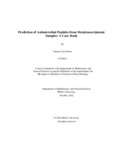Prediction of Antimicrobial Peptides from Metatranscriptomic samples: A case study

View/
Date
2022-10Publisher
Brac UniversityAuthor
Tuj-Johora, FatemaMetadata
Show full item recordAbstract
The COVID-19 pandemic has shed new light on the ongoing antimicrobial
resistance (AMR) global crisis as the use of antibiotics has dramatically increased
to treat severely ill patients. In this post-pandemic era, the world is in urgent need
of new and effective drugs that can fight multiple drug-resistant (MDR) bacterial
infections. Natural antimicrobial peptides (AMP) are produced as a first line of
defense in almost all living beings and they offer the most promising alternative to
conventional antibiotics. These peptides are able to eliminate MDR bacteria
through a set of killing mechanisms that do not induce bacterial resistance quickly.
Moreover, they are effective against other classes of pathogens including virus,
fungi, protozoa etc. as well as containing antitumor, anticancer and
immunomodulatory properties. The comprehensive advantages of AMPs led to
extensive ongoing research and trials to make AMP-based drugs commercially
available for clinical purposes. Metagenomics is a culture-independent technique
to study and characterize unculturable microbes, which can be applied to identify
organisms and their bioactive components, including AMPs, from diverse
environmental samples. This review provides a brief overview of the origins,
functions, and potentials of AMPs, including the computational identification of
putative AMPs, and also discusses the concepts and applications of metagenomics
and Metatranscriptomics. Finally, a case study employs a workflow for predicting
probable AMPs from the metatranscriptomic data of uncultured marine sediment
microbiota, and characterizes the identified peptides both structurally and
functionally. The establishment of such prediction pipelines makes way for
discovering novel AMPs from the ever-increasing metagenomic data.
